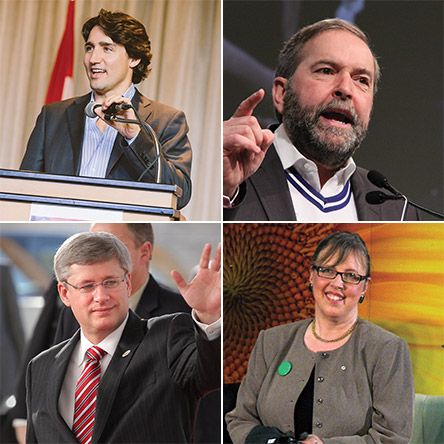The post-season stretch
 CREDIT: TRUDEAU: JOHN MCCALLUM ON FLICKR (CC BY-ND 2.0), MUCLAIR: UNITED STEELWORKERS ON FLICKER (CC BY-SA 2.0), HARPER: PETER MACDIARMID / GETTY IMAGE NEWS / THINKSTOCK,
CREDIT: TRUDEAU: JOHN MCCALLUM ON FLICKR (CC BY-ND 2.0), MUCLAIR: UNITED STEELWORKERS ON FLICKER (CC BY-SA 2.0), HARPER: PETER MACDIARMID / GETTY IMAGE NEWS / THINKSTOCK,In October we will know which one of these political party leaders will be Prime Minister.
Canadians across the country are marking down the fourth week of October in eager anticipation. After a remarkable effort, one team may have the opportunity to win it all, and I am not talking about the Blue Jays.
With the federal election scheduled for October 19 there will be no shortage of volunteers roaming the halls making you late for class, bombarding you with information you could not care less about.
In Canadian politics the frequent refrain is that it does not matter who is in office because the candidates are virtually indistinguishable. While several of the candidates have platforms that share a number of key issues, they all differ to some extent.
Unlike the two-party system of our neighbours to the south, Canadians have four real choices in terms of which party they want to vote into office. Candidates have the option of running without party affiliation but the House of Commons is primarily composed of members of the Progressive Conservative Party, the Liberal Party or the New Democratic Party.
While the Green Party has representation in the House of Commons, it lacks the strength in numbers to be a serious contender.
The outcome of October’s election will depend on how the leaders and their parties choose to campaign in the next couple of months, but there are several key issues for Canadians to consider before casting their vote.
Income splitting allows for one member of a domestic partnership to claim a portion of their partner’s income to lower the amount of income tax charged. The Conservative Party stands alone in its support of this policy with both the Liberal Party and the NDP claiming that they would cancel it.
Similarly, the Conservatives – despite widespread criticism – introduced Bill C-51; the Liberal Party has promised to amend the bill while the NDP claims it would throw it out entirely.
The New Democratic Party, led by Thomas Mulcair, will attempt to capitalize on the orange wave that started with last year’s provincial election in Quebec, which spread to Alberta this past spring.
The results were due to rampant disappointment in the traditional party of choice for the respective provinces. Simply being the third choice was all it took to earn a majority of votes and it is possible that could be the case at the federal level as well.
Prime Minister Stephen Harper’s time in office has been marked by radical changes in environmental policy and a general unwillingness to tolerate dissent.
Son of former Prime Minister Pierre Trudeau and Liberal Party leader, Justin Trudeau, comes from a practically noble birth – by Canadian standards. The Liberal Party leader is struggling to define himself in the current political landscape, aligning him with many NDP policies while attempting to appeal to Conservative malcontents.
Every vote Trudeau gains from the right he will inevitably lose on the left with the added disadvantage of appearing indecisive.
With weeks to go before polls open, voters can be prepared for a marathon campaign trail consisting of ugly election signs, shameless pandering and awkward photo-ops.
Go Jays go.
Editorial opinions or comments expressed in this online edition of Interrobang newspaper reflect the views of the writer and are not those of the Interrobang or the Fanshawe Student Union. The Interrobang is published weekly by the Fanshawe Student Union at 1001 Fanshawe College Blvd., P.O. Box 7005, London, Ontario, N5Y 5R6 and distributed through the Fanshawe College community. Letters to the editor are welcome. All letters are subject to editing and should be emailed. All letters must be accompanied by contact information. Letters can also be submitted online by clicking here.














